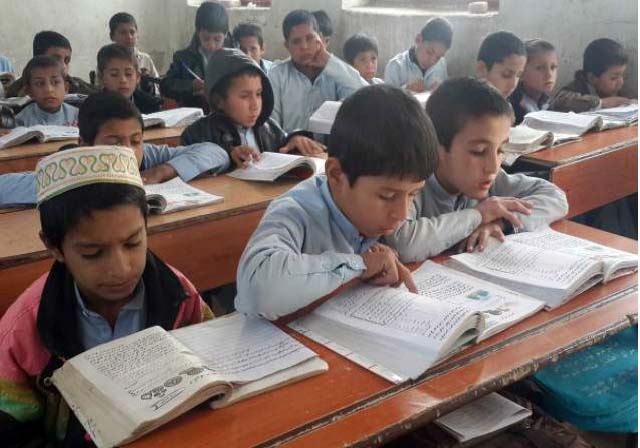Despite some progresses, there is a wide gap between the quality of the Afghan education system comparing to regional and global standards. With 31 percent the country retains one of the lowest literacy rates in the world. It seems that a key factor in these low literacy rates is Afghanistan’s severe lack of educators and low quality teaching. The statistics state that 170,000 teachers are currently working to educate over 8 million students. Among this small amount of teachers, only 24 percent are legally qualified for instruction, meaning that they completed two years of educational training after high school. In certain areas, the shortage of instructors are so severe that schools are employing teachers that have only passed sixth or seventh grade despite the fact that this is illegal. The university graduated talents are not willing to become teacher either due to low salary or variety of corruptions. In some areas, teachers must bribe to get salary or wait for three to six months so that they can get their salary. Furthermore, the number of female school instructors representing are just 30 percent of teachers nationwide. Afghan girls face many obstacles when it comes to their education, including early marriage, conflicts and inaccessibility to nearby schools. As a result, only 9.2 percent of girls reach secondary school, compared to 28 percent of boys.
In addition to low teaching quality, there are many other issues such as old shaky school buildings, overcrowding, which mean that multiple students must share a desk or up to ten students must share a textbook especially in the discriminated areas. Most schools have resorted to operating on split shifts wherein students only receive three hours of instruction each day. While this makes up for the extreme overcrowding, the quality of education in Afghanistan is further weakened. Child labor has also been a serious issue in Afghanistan, and it has hindered many children to get education. According to UNICEF, approximately one quarter of children ages 7 - 14 were working in recent years, with higher numbers occurring in more rural areas. Child labor makes it much more difficult for many to attend school, while it keeps some from education completely. Students who are enrolled often fail to attend school on a regular basis due to outside obstacles like early marriage, child labor and most importantly security issues.
Quantitatively, Afghanistan is still one of the countries where many school-age children have no access to schooling. According to the UN Children’s agency (UNICEF), a large portion of the children living in conflict zones are deprived of schooling, with Afghanistan the fourth worst-affected countries after South Sudan, Niger and Sudan and a staggering 40 percent of school-age children in Afghanistan are out of school. It is obvious when children are not in school they are at an increased danger of abuse, exploitation, and recruitment into armed groups. Conflict and fragile security impedes delivery of school supplies, enrolment, monitoring and school supervision these challenges are exacerbated by entrenched tribal norms that oppose the education of girls. Early marriage also often interrupts the education of such girls as may have been fortunate enough to enter school. Overall, around Sixty percent of the 4.2 million out-of-school children are girls, and there are no female students enrolled in grades 10-12 in 200 out of 412 urban and rural Districts throughout the country.
Like many other sectors, the education is also undermined by corruption. According to a previous probe there are many ghost schools receiving funds while there is no staff or students, or the number of staff and students are fabricated. The issue highly brings the last decade achievements of Afghanistan’s education sector under question. The existing challenges to the education sector underscore the need for the national unity government to take actions in addressing the challenges in the sector.
It seems that education is not in priority of Afghan policy makers; the prestige of the teaching profession rather than other professions and occupations are the lowest in the country comparing to other countries; as learning example, in Japan the elementary teachers ranked 9th and 18th in public esteem, out of 82 occupations. Principals' prestige was higher than that of department heads of large corporations, public accountants, and authors. Elementary teachers enjoyed higher prestige than civil and mechanical engineers, white collar employees in large firms, and municipal department heads. University professors were ranked third, below court judges and presidents of large companies, but above physicians. So, the Competition for becoming a formal teacher continues to be intense; for example, there are 200,000 applicants annually for approximately 38,000 vacancies in Japan public school system.
Consequently, there are huge gaps in education standard in Afghanistan comparing to advanced countries that can play a learning role for our policy makers. For instance, Japan has 100% literacy rates and Russia has 99.7%, Turkey 95%, Kazakhstan 99.8 and Malaysia 94.6% in the world while Afghanistan has one of the lowest literacy rate, currently estimated at about 31% of the adult population and Female literacy levels are on average 17%, with high variation, indicating a strong geographical and gender divide. Japanese teachers’ get around 7500$ per month whilst ours get around 100$ per month. Many countries have 100% qualified teachers while we have 76% unqualified teachers which mean they are under 14 grade. Many developed countries, including France, Germany and Norway, have provide preschool programs for three and four-year-olds for decades. But Afghanistan with 10 millions uneducated people has the lowest level of participation in Early Childhood Education and Care (ECEC) in the world. Legally many countries have a compulsory education law while it is optional in Afghanistan.
Home » Opinion » Prioritizing Education
Prioritizing Education
| Mohammad Zahir Akbari

